
Critical Analysis - “Finding Aicha”
(director - Dr. Myriam Francois)
“Finding Aicha” is everything one expects to see in an impactful documentary with its structural elements ideally developed. This is by far not an accomplishment to be taken lightly especially when documentaries deal with sensitive and controversial topics such as the one at hand. To say that director/journalist Dr. Myriam Francois successfully delivered a difficult task would be a big understatement.
On the 13th of November 2015, one of the deadliest attacks since World War II carried out by ISIS militants, took place in Paris. Nine IS group gunmen and suicide bombers struck within minutes of one another at several locations including Bataclan theatre, where 90 innocent people were killed and hudrends were injured.
One of the three Bataclan attackers was 28 years old Samy Amimour, son of Azdyne and Mouna, father of Aicha, believed to have been in Syria with his wife and daughter, until Azdyne during an interrogation by the French secret service found out that his son Samy, was lying dead at Bataclan.
With their granddaughter in a camp in Syria and no official documents proving family links, Azdyne and Mouna are pushing for Aicha’s return. This is a story of repatriation.
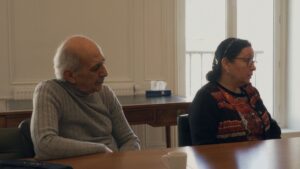
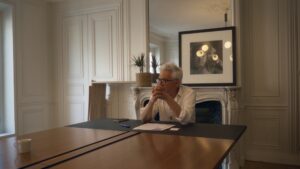 Azdyne and Mouna with their lawyer during a meeting regarding Aicha's repatriation
Azdyne and Mouna with their lawyer during a meeting regarding Aicha's repatriation
Viewers are drawn into the story from second one by the powerful symbolic shot of Azdyne’s gaze at a riverboat on Seine river, instantly feeling an emotional response to his wondering, “Becoming a grandfather should have been one of the most beautiful moments in my life” while at the same time investing in the film’s outcome as Azdyne concludes, “But for me it was linked to a major trauma”.
This is what a good documentary filmmaker does when dealing with such complex subjects, namely creating a powerful impact, advancing the story forward with every frame of the film from its very beginning.
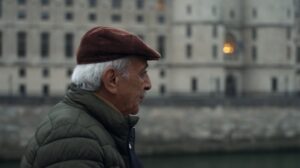 Azdyne Amimour on the bank of the Seine.
Azdyne Amimour on the bank of the Seine.
Never straying from its subject, viewers are angered by a sufficiently paced linear narrative structured on a set of absorbing interviews and narrations, not only raising awareness about the unrepatriated children, forgotten alive in “temporary settlements” but also inspiring us to take action.
Masterfully using terrorsim as a Controlling Idea, Dr. Myriam Francois through honesty, avoids stereotypic cliches and gets to the heart of a topic that should “not go quietly into the night”. A topic ought to be told. Providing useful insights to a complex sociopolitical issue encourages the audience to raise questions, dispute and challenge the current state of social structure and its values, capturing at the same time the truth of a major historical moment.
Bringing together the two opposite stands, Azdyne and George Salines, father of the 29 years old Bataclan victim Lola, who might as well have been one of Samy’s victims, Myriam Francois introduces a powerful dramatic duality piecing together the different strands of one of the deadliest terrorist massacres in the European continent which instilled insecurity and fear, deep inside the core of what was accepted as “normal everydayness”.
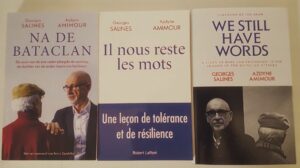 Azdyne Amimour and George Salines and their book
Azdyne Amimour and George Salines and their book
Composition, lighting, camera blocking and carefully chosen angles create a solid filmic narration while editing adds emotional meaning to a story that unfolds undisrupted by superfluous juxtapositions. The original score by Safy Boutella makes a strong, memorable impression, enhancing the emotional elements of the story adding to the overall aesthetic experience.
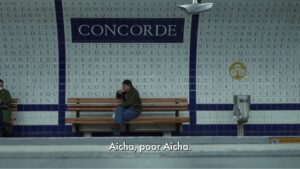
With dramaturgic and cinematic consistency Myriam Francois tells an important story in an authentic and honest way by blending dynamic storytelling and good journalism.
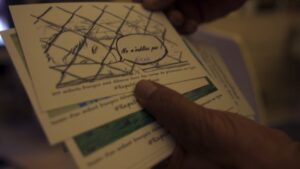
Bringing forward vital information that should be known by the public, including Mouna’s voice who speaks of a once innocent boy who probably wouldn’t recognize her if she stood in front of him “that day, that moment”, shows us different perspectives unprejudiced, opening our minds and hearts to the struggles of collateral victims who continue to be victimized due to bureaucratic rigidity and lack of political will.
Victims like Aicha and all the Aichas in this world.
“Finding Aicha” is the kind of documentary which makes the world a better place to live. Aiming to heal and bridge the abysmal riffs the Enceladus of terrorism leaves behind.
It is a hymn to the memory of the people lost in vain. Whose lives were violently interrupted in agonizing fear, left in oblivion, or maybe went to a better place, who can tell, deprived nevertheless of a future they so well deserved. Of the dreams and hopes and love they so well deserved. People like 28 years old, Lola. Lola, who, like Aicha, was not to blame.
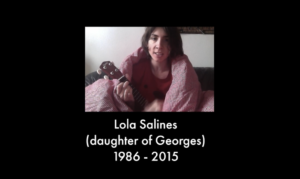
Kiriakos Kotsinis
BSc, MA




